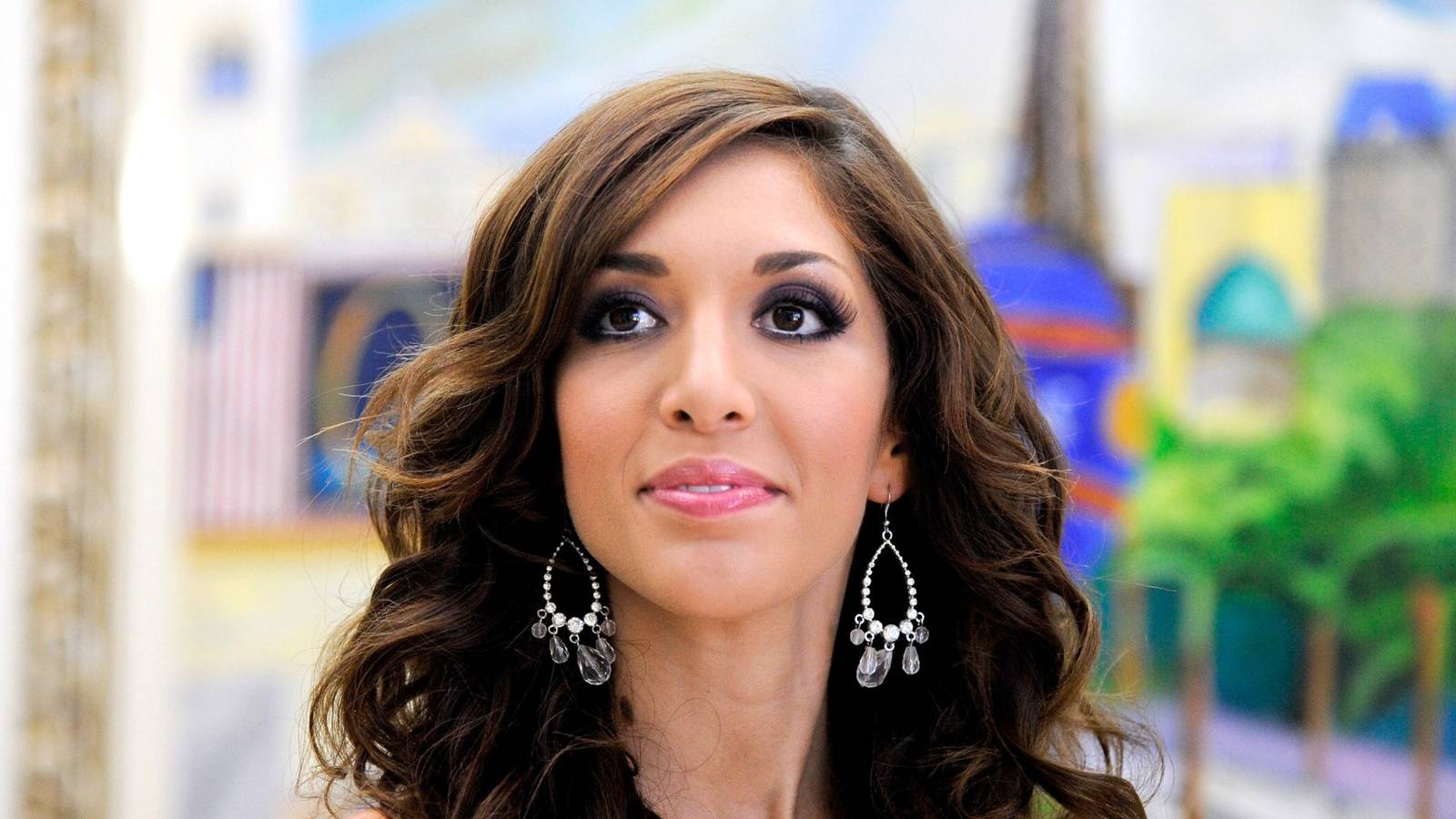:max_bytes(150000):strip_icc():focal(714x300:716x302)/farrah-abraham-good-day-new-york-032025-d49ac36ec4444a2eb74d273eff9a7a42.jpg)
The world has watched Farrah Abraham grow up in front of the cameras, from her early days on ‘Teen Mom’ to her ventures in entertainment and motherhood. Throughout it all, one constant has been the often-turbulent relationship with her parents, Debra Danielsen and Michael Abraham. Now, Farrah is pulling back the curtain on the deepest, most personal reasons behind her decision to cut ties, a choice that has also resonated with her daughter, Sophia.
This isn’t just another celebrity story; it’s a powerful narrative about personal growth, healing from past wounds, and the courageous act of setting boundaries. Farrah, now 34, has been incredibly open about the transformative journey that led her to prioritize her mental and emotional well-being, even if it meant stepping away from family connections that no longer served her. Her reflections offer a candid look into the intricate dynamics of family relationships and the profound search for inner peace.
Through raw honesty and direct quotes, Farrah shares her truth, shedding light on the pivotal moments and realizations that shaped her path. This in-depth look explores the core principles guiding her decisions, the profound impact of loss, and her unwavering commitment to fostering a safe and independent life for herself and her daughter. Prepare to dive deep into Farrah’s world as we unpack the very personal reasons behind her significant life changes.

1. **The Core Reason: A Lack of ‘Safe Space’**At the heart of Farrah Abraham’s decision to cut contact with her parents lies a fundamental need for what she calls a ‘safe space.’ She eloquently articulated this during an interview, explaining that the absence of protection was a critical missing piece in her relationships. For Farrah, love and protection were intrinsically linked, and she candidly admitted that this essential element was simply not present in her past family dynamics.
Farrah revealed that identifying this pattern was a breakthrough, stating, “number one was giving my love for protection, and I never got protection from anyone in my life.” This wasn’t just about emotional comfort; it was about a deeper sense of security that she felt was consistently lacking. This profound realization became a cornerstone of her decision to re-evaluate who she allowed into her innermost circle, leading her to create the boundaries necessary for her well-being.
She further elaborated on the consequences of this absence, connecting it directly to the people no longer in her life. “That’s why you really don’t see anyone in my life of the past, because they did not serve something that I definitely need, which is a safe space,” Farrah explained. This powerful statement underscores her commitment to surrounding herself with individuals who contribute positively to her life, rather than those who perpetuate a feeling of vulnerability or insecurity.
Her journey highlights a universal truth: everyone deserves to feel safe and protected in their closest relationships. Farrah’s openness about her experiences resonates with anyone who has grappled with defining healthy boundaries and understanding the profound impact that a true ‘safe space’ can have on one’s emotional and psychological health.

2. **The 12-Step Relationship Program’s Influence**Farrah’s path to clarity and boundary-setting was significantly guided by her embrace of a 12-step relationship program and inventory. This structured approach provided her with the tools to meticulously examine her past relationships, enabling her to identify recurring patterns and understand their impact on her life. It wasn’t a quick fix, but a dedicated process of introspection and healing.
The program involved a deep dive into her relational history, as she explained, “That’s going down your mom, your dad, maybe some people you dated, some others — relationships that stand out to you, that may have impacted you in a good way or a bad.” This systematic review allowed her to uncover the underlying dynamics that had shaped her interactions and perceptions throughout her life, leading to crucial insights.
“Then by the end of that, you see, ‘Hey, what are these patterns that I’ve allowed in my life with people?'” Farrah reflected. This process of pattern recognition was instrumental in helping her understand why certain relationships unfolded as they did and, more importantly, how she could prevent similar patterns from continuing in her future. It was about taking ownership of her relational choices and moving forward with newfound awareness.
Her commitment to this guidance is unwavering. On the Miss Understood podcast, Farrah shared, “I am doing what’s best for my psychotherapist’s guidance, and everyone else who’s living by the 12 Steps. So I am going very hard and fearless with that.” This demonstrates her serious dedication to personal growth and her willingness to follow a structured path towards healthier relationships and overall well-being. It’s a testament to her courage in confronting deeply ingrained patterns for a more balanced life.

3. **Conditioned to Not Be Independent**Beyond the immediate family dynamics, Farrah Abraham has reflected on a broader societal issue that she believes contributes to people struggling with independence. She posits that many individuals are “conditioned otherwise to not be our own independent selves,” suggesting that societal norms and upbringing often subtly steer people away from radical self-reliance. This insight speaks to a journey not just of personal healing, but also of challenging entrenched beliefs.
For Farrah, breaking free from this conditioning has been a core part of her personal transformation. She sees the fight for independence as a universal struggle, one that not everyone gets to fully experience in their lifetime. Her own journey, often lived under public scrutiny, has amplified her conviction that true freedom comes from within, by consciously rejecting these conditioning forces.
In her candid remarks, Farrah highlighted the difficulty of this path, stating, “It’s just we have been conditioned otherwise to not be our own independent selves. And I think that’s what everyone is fighting for in their life, and some never get to see that.” This reveals a profound understanding that self-determination is often hard-won and requires conscious effort, a battle she appears determined to win for herself.
Her commitment to her own independence is not merely a preference; it’s a deeply held philosophy that informs her life choices. By embracing her authentic self and fostering self-reliance, Farrah is not only navigating her own complex family relationships but also advocating for a more empowered existence for herself and, implicitly, for others who might be facing similar struggles. It’s a powerful message about carving out one’s own identity, free from external pressures.

4. **The Impact of Derek’s Death**The tragic loss of her boyfriend, Derek Underwood, in a car accident in 2008, just two months before their daughter Sophia was born, cast a long shadow over Farrah’s life and significantly impacted her relationship with her parents. This immense grief, coupled with the imminent arrival of her child, was a crucible that revealed the true nature of her family’s support, or lack thereof. It was a time when she desperately needed comfort and understanding, but found something else entirely.
Farrah openly shared that her mother, Debra, was not “the mom that [she] needed” during this profoundly difficult period. The expectation of maternal solace and guidance during such an unimaginable trauma was not met, leading to deep disappointment and a sense of isolation. This lack of support during a vulnerable time became a significant source of pain and resentment that lingered for years, informing her future decisions about who she could truly rely on.
Her parents’ reaction during Derek’s death was a pivotal moment that cemented her feelings of being unsupported. As a young woman facing widowhood and single motherhood, Farrah needed empathy and strength from her family. Instead, their responses intensified her suffering, making a heartbreaking situation even more unbearable. This period starkly highlighted the emotional chasm that existed between her and her parents, contributing to the fractured relationship that would evolve over time.

5. **Childhood Anger and Unsupportive Reactions**The profound grief and lack of support Farrah experienced after Derek’s death ignited a deep-seated anger within her, a raw emotion that she carried for a significant period. She candidly recalled, “There was a lot of anger within me back then.” This wasn’t a fleeting emotion, but a powerful internal response to feeling abandoned and misunderstood during one of the darkest times of her life. It was an anger born from a desperate need for protection and comfort that was left unfulfilled.
Farrah emphasized the intensity of this anger, stating with conviction, “If you make anything harder towards a young lady who is a widower, you will see some anger, like you have never seen a darkness of anger.” This powerful description underscores the depth of her pain and the severity of her family’s actions, which, instead of offering solace, reportedly compounded her anguish. For a young woman already reeling from loss, additional burdens were simply unbearable, triggering a forceful emotional reaction.
This unsupportive environment made her realize that she didn’t “even want to be around these people.” The emotional strain of navigating her grief and impending motherhood without her family’s unwavering support led to a profound disillusionment. She felt her family was “not supporting her” through such a tough time, a revelation that planted the seeds for her eventual decision to distance herself. The absence of a nurturing environment during her most vulnerable moment was a wound that proved difficult to heal, ultimately driving her towards a path of self-preservation and separation.

6. **Embracing Independence and Self-Gift**Farrah Abraham’s journey has culminated in a powerful embrace of self-reliance and a profound understanding that personal well-being is a gift she must give herself. She has learned to prioritize looking after herself, a pivotal shift in her life. This radical self-care is not about malice or resentment towards her family, but about fostering her own mental and emotional health, a lesson hard-earned through years of public scrutiny and personal challenges.
Farrah insists that the decision to not speak to her parents is “not a sad, not a bad, not a hard thing.” This perspective reframes what might appear to outsiders as a painful estrangement into an act of self-preservation and liberation. It speaks to a level of acceptance and peace that comes with making choices aligned with one’s authentic self, rather than conforming to external expectations of family cohesion at all costs.
She articulated this empowering philosophy beautifully, saying, “I have to say, the more that you have your independence, the more that you have your own brain, the more that you are authentically and only you. And no one else gives you that, only you can give that gift to yourself.” This statement is a declaration of self-ownership, highlighting that true authenticity and independence are internal achievements that cannot be bestowed by others but must be cultivated from within. It’s a powerful testament to her personal growth.
This newfound independence is central to her current happiness and stability. By taking control of her own narrative and choosing her emotional environment, Farrah has stepped into a space of self-empowerment. It’s a clear message that sometimes, the greatest act of love and protection we can offer ourselves is to create the boundaries necessary for our own peace, even if it means loving certain relationships from a distance.




